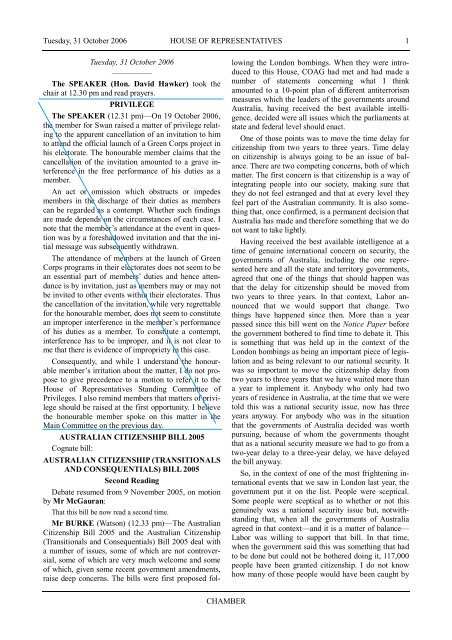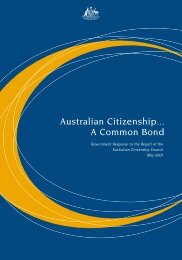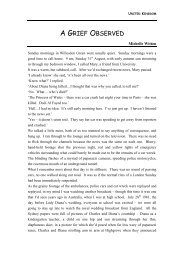HOUSE OF REPRESENTATIVES - The Southern Cross Group
HOUSE OF REPRESENTATIVES - The Southern Cross Group
HOUSE OF REPRESENTATIVES - The Southern Cross Group
Create successful ePaper yourself
Turn your PDF publications into a flip-book with our unique Google optimized e-Paper software.
Tuesday, 31 October 2006 <strong>HOUSE</strong> <strong>OF</strong> <strong>REPRESENTATIVES</strong> 1<br />
Tuesday, 31 October 2006<br />
—————<br />
<strong>The</strong> SPEAKER (Hon. David Hawker) took the<br />
chair at 12.30 pm and read prayers.<br />
PRIVILEGE<br />
<strong>The</strong> SPEAKER (12.31 pm)—On 19 October 2006,<br />
the member for Swan raised a matter of privilege relating<br />
to the apparent cancellation of an invitation to him<br />
to attend the official launch of a Green Corps project in<br />
his electorate. <strong>The</strong> honourable member claims that the<br />
cancellation of the invitation amounted to a grave interference<br />
in the free performance of his duties as a<br />
member.<br />
An act or omission which obstructs or impedes<br />
members in the discharge of their duties as members<br />
can be regarded as a contempt. Whether such findings<br />
are made depends on the circumstances of each case. I<br />
note that the member’s attendance at the event in question<br />
was by a foreshadowed invitation and that the initial<br />
message was subsequently withdrawn.<br />
<strong>The</strong> attendance of members at the launch of Green<br />
Corps programs in their electorates does not seem to be<br />
an essential part of members’ duties and hence attendance<br />
is by invitation, just as members may or may not<br />
be invited to other events within their electorates. Thus<br />
the cancellation of the invitation, while very regrettable<br />
for the honourable member, does not seem to constitute<br />
an improper interference in the member’s performance<br />
of his duties as a member. To constitute a contempt,<br />
interference has to be improper, and it is not clear to<br />
me that there is evidence of impropriety in this case.<br />
Consequently, and while I understand the honourable<br />
member’s irritation about the matter, I do not propose<br />
to give precedence to a motion to refer it to the<br />
House of Representatives Standing Committee of<br />
Privileges. I also remind members that matters of privilege<br />
should be raised at the first opportunity. I believe<br />
the honourable member spoke on this matter in the<br />
Main Committee on the previous day.<br />
AUSTRALIAN CITIZENSHIP BILL 2005<br />
Cognate bill:<br />
AUSTRALIAN CITIZENSHIP (TRANSITIONALS<br />
AND CONSEQUENTIALS) BILL 2005<br />
Second Reading<br />
Debate resumed from 9 November 2005, on motion<br />
by Mr McGauran:<br />
That this bill be now read a second time.<br />
Mr BURKE (Watson) (12.33 pm)—<strong>The</strong> Australian<br />
Citizenship Bill 2005 and the Australian Citizenship<br />
(Transitionals and Consequentials) Bill 2005 deal with<br />
a number of issues, some of which are not controversial,<br />
some of which are very much welcome and some<br />
of which, given some recent government amendments,<br />
raise deep concerns. <strong>The</strong> bills were first proposed fol-<br />
CHAMBER<br />
lowing the London bombings. When they were introduced<br />
to this House, COAG had met and had made a<br />
number of statements concerning what I think<br />
amounted to a 10-point plan of different antiterrorism<br />
measures which the leaders of the governments around<br />
Australia, having received the best available intelligence,<br />
decided were all issues which the parliaments at<br />
state and federal level should enact.<br />
One of those points was to move the time delay for<br />
citizenship from two years to three years. Time delay<br />
on citizenship is always going to be an issue of balance.<br />
<strong>The</strong>re are two competing concerns, both of which<br />
matter. <strong>The</strong> first concern is that citizenship is a way of<br />
integrating people into our society, making sure that<br />
they do not feel estranged and that at every level they<br />
feel part of the Australian community. It is also something<br />
that, once confirmed, is a permanent decision that<br />
Australia has made and therefore something that we do<br />
not want to take lightly.<br />
Having received the best available intelligence at a<br />
time of genuine international concern on security, the<br />
governments of Australia, including the one represented<br />
here and all the state and territory governments,<br />
agreed that one of the things that should happen was<br />
that the delay for citizenship should be moved from<br />
two years to three years. In that context, Labor announced<br />
that we would support that change. Two<br />
things have happened since then. More than a year<br />
passed since this bill went on the Notice Paper before<br />
the government bothered to find time to debate it. This<br />
is something that was held up in the context of the<br />
London bombings as being an important piece of legislation<br />
and as being relevant to our national security. It<br />
was so important to move the citizenship delay from<br />
two years to three years that we have waited more than<br />
a year to implement it. Anybody who only had two<br />
years of residence in Australia, at the time that we were<br />
told this was a national security issue, now has three<br />
years anyway. For anybody who was in the situation<br />
that the governments of Australia decided was worth<br />
pursuing, because of whom the governments thought<br />
that as a national security measure we had to go from a<br />
two-year delay to a three-year delay, we have delayed<br />
the bill anyway.<br />
So, in the context of one of the most frightening international<br />
events that we saw in London last year, the<br />
government put it on the list. People were sceptical.<br />
Some people were sceptical as to whether or not this<br />
genuinely was a national security issue but, notwithstanding<br />
that, when all the governments of Australia<br />
agreed in that context—and it is a matter of balance—<br />
Labor was willing to support that bill. In that time,<br />
when the government said this was something that had<br />
to be done but could not be bothered doing it, 117,000<br />
people have been granted citizenship. I do not know<br />
how many of those people would have been caught by




